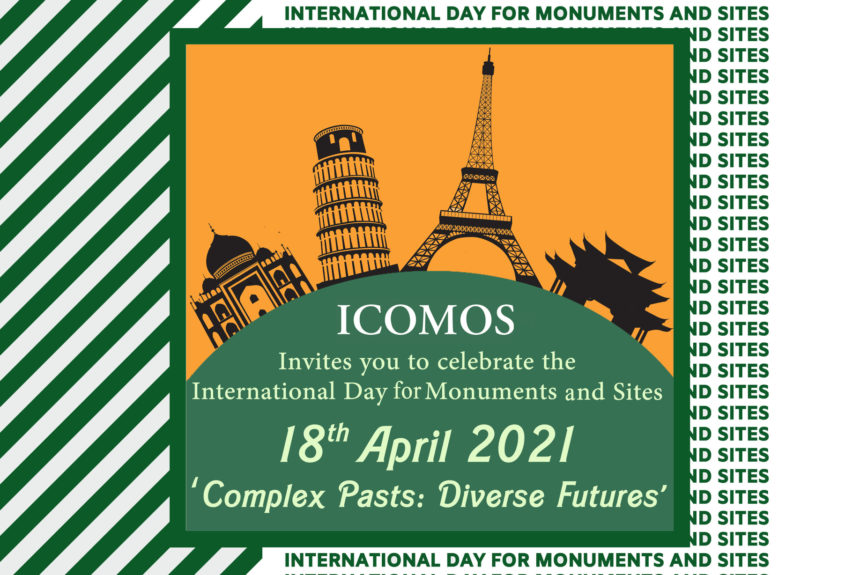On the evening of Sunday, April 18, 2021, the Libya Academy for Advanced Studies organized a meeting via the Zoom platform, on heritage and archaeological sites in Libya, on the occasion of: International Day of Monuments and Archaeological Sites, hosting a professor specializing in archaeology from Omar Al-Mukhtar University, and the meeting was moderated by Professor Mahmoud bin Zahraa.
Dr. spoke. Fathallah Khalifa Al-Haddad
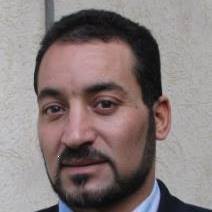
Head of the Department of Archeology, Faculty of Arts, Omar Al-Mukhtar University.
President of the Balagray National Association for Environment, Archeology and Tourism.
Former Director of the Green Mountain Tourism Office.
He said: People are proud of their heritage, history, and diverse civilizations. Our antiquities are our identity, and this land has passed through multiple civilizations. We should be proud of the Libyan antiquities that exist everywhere. For example, the city of Al-Bayda, historically called Belgray, has more than 258 archaeological sites, and there are hardly any. One kilometer on this land does not contain antiquities, which need to be discovered, identified and excavated, and the antiquities discovered in Libya represent only about 20%.
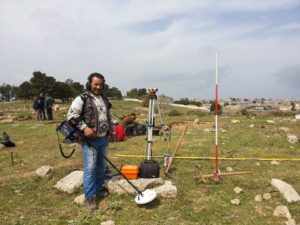
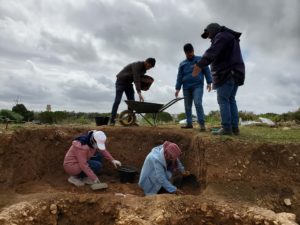
(Excavations and training) Professors and students of the Department of Archeology, Faculty of Arts, Omar Al-Mukhtar University.
He pointed out the problem of the lack of role of the security authorities, the problem of registering and preserving archaeological sites, the problem of officials’ lack of awareness, and the failure to choose competent, specialized officials who are concerned with preserving heritage and making it known in an optimal manner locally and globally, and highlighting archaeological sites to preserve them, hand them over to future generations, and invest in them. He also pointed out the problem of the weakness of the controlling authorities in ports, airports and ports, and the security chaos in the country had a negative impact on this.
He mentioned a number of important no’s:
- No to destroying or removing sites and antiquities, as happened in southern Cyrene and the village of Massa, where the church there, which is a rare type of church, was destroyed, and the cemetery of Massa was destroyed, which is a circular cemetery, a style known as Tuburlus, one of the oldest cemeteries, dating back to the sixth century BC.
- No to illegal excavations and tampering with archaeological sites, which some people do for the purpose of smuggling and selling. Libya has thousands of archaeological sites that are excavated on a daily basis, and this poses a danger to the sites, and this is national security that must be preserved.
- No to defacing monuments by writing on them, throwing garbage, or setting fires.
- No to smuggling and trading antiquities out of Libya.
- No to grazing animals inside archaeological sites.
- Do not build inside or near archaeological sites, as building there is a loss and destruction of them and an attack on the sanctity of the archaeological area.
He also pointed out a number of blessings:
- Yes, to support the Antiquities Authority financially and morally, so that it can fulfill its mission of caring for antiquities
- Yes, to support the Antiquities Authority by appointing a good, competent and specialized official.
- Yes to establishing museums, spreading awareness in the media, and informing citizens.
- Yes, to form an antiquities police force and crack down on violators with an iron fist, in accordance with the law and governmental legitimacy.
He also answered the question: Heritage in Libya: What is meant by it? Are there places heritage, how old are they supposed to be, and does it include heritage (customs, traditions, dress, mosques, corners, churches, palaces, inscriptions, and everything old?)
He said: Antiquities are a material cultural heritage, such as mosques, corners, clothing, and food, including: the old Libyan house made of goat hair, hair, and wool, and the furniture of this house. This heritage is neglected by our state. Some civil institutions, such as a civil society organization in the village of Massa, made various efforts and collected more. A quantity of collectibles from the Libyan cultural heritage, and I placed them in a place (which is the old church) after obtaining permission from the authority responsible for them, which is the Vatican, in a clear negligence on the part of the Libyan governments and the responsible authorities, and all of these should be in a luxurious contemporary museum to display and preserve these objects.
We have a crisis regarding the importance of heritage and how to manage heritage. Italian buildings and streets, which is a stage that Libya went through, we must not deny. These buildings are neglected and vulnerable to demolition and obliteration despite their distinctive beauty.
Man has existed in Libya for more than 200,000 thousand years, and each stage has its distinctive effects that must be shown, cared for, and preserved.
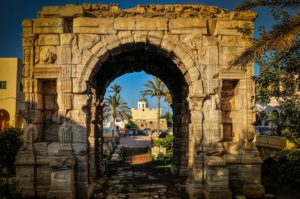
Regarding the question: Do Libyan laws meet the conditions in their texts and legislation in terms of accommodating everything related to antiquities, preservation, prosecution, and penalties?
He answered that the laws have a problem, and the security reality has problems, and there are statements in archaeological areas to build clubs, and this is a very big problem, affecting Libyan national security, and we cannot do anything in light of the presence of weapons, and we should not issue statements while waiting for the state to stabilize and the problems to go away.
Regarding the question: What is the role of all types of media in introducing and paying attention to heritage? Are there plans for dedicated programs in this?
He answered: There is no permanent strategic coordination in raising awareness, and every Libyan should know that these antiquities belong to us and to society, but some media professionals record some special programs, and in the past period there has been a beautiful program about the name and its meaning, an educational and excellent program, and I participated in some of its episodes.
There should be a strategy based on the Antiquities Department, so that fixed areas are given to deal with antiquities. Unfortunately, most channels fuel conflicts and their last interest is heritage.
The Libyan textbook should also pay attention to, and should include, an introduction to Libya’s antiquities and its pictures.
It is worth motivating merchants by bringing in brochures, on which are placed pictures of our heritage, our clothing, our homes, and our possessions, instead of various international, non-Libyan pictures.
These roles and responsibilities should be carried out by education officials and the Chamber of Commerce and Industry, in communication with the Ministry of Culture, channels and media, by allocating sufficient budgets for this.
And about introducing the efforts of local and international antiquities teams and the unique and distinguished personalities who have a patriotic sense in preserving everything that is Libyan?
He answered by saying: There are efforts in universities, including workshops, honours, works and introductions, but media coverage is almost non-existent, even if it is only in a few minutes. Our capabilities are limited, and university budgets are limited, and the problem of the state’s lack of unity and division is the reason for the loss of efforts, money and ideas, and our people have become ignorant. From him he destroys himself.
He answered the question: Are there detailed, introductory and cartographic books for the archaeological and heritage areas present in our country in different eras and countries, which represent various forms?
He said: There are some books, but they do not cover all the archaeological sites. There are many books about the major cities. Most of the books and studies are in different languages and are not translated. They require efforts and budgets in translation and printing.
The first Phoenician-Arabic dictionary, written by Dr. Abdul Hafeez Al-Mayar, a professor at the University of Tripoli. This dictionary was delivered to Omar Al-Mukhtar University for printing a while ago, because the university suffers from the problem of financial funding for printing. Some books have been waiting for 10 years!
Al-Ferjani Library in Tripoli plays various roles in printing informational works, and there are also simple publishing houses that carry out some informational works and books. Likewise, the Center for Historical Studies in Tripoli has an important role in printing and publishing, and now it suffers from many problems that are not hidden from you.
But we need greater production and translation, support for academics, and giving them their rights. We need more support and publishing, financial support for institutions and translators.
He concluded by saying: Everything we talked to him, we presented in writing to the Prime Minister, and we hope to work on its implementation, in order to preserve this great legacy for future generations. This country is not ours alone, but rather for our grandchildren and for those who come after us, so we should not be selfish, but rather preserve and do our part to the fullest. Face.
Then Dr. Ahmed Issa Farag spoke
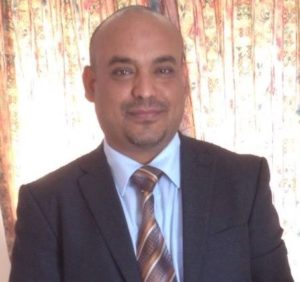
Professor in the Department of Archeology, Omar Al-Mukhtar University, and specialist in antiquities management from British universities
He is the representative of the municipality of Shahat to the Union of the Five Libyan World Heritage Municipalities.
He talked about the importance of the International Day for Monuments and Archaeological Sites, and that it is confused with World Heritage Day. This day was established by the International Council on Monuments and Sites, and its celebration began in 1983. It includes international and local sites. It was established in order to draw local authorities to the importance of this.
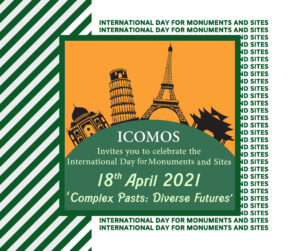
The heritage in Libya has historical diversity since prehistoric times, Phoenician antiquities in the west of the country, Greek antiquities in the east of the country, and the conflict that occurred between them in Libya, all of which represent a distinct historical value, also the Roman period, and Libya had the lion’s share in the east. The West and the South, then the Islamic period, and all of this created a strange and wonderful archaeological diversity. Every square meter in Libya contains antiquities that still require uncovering, studies, excavations and research.
The relationship of this heritage to the population and the past and its creation of unique cultural diversity should be contemplated.
This heritage has economic value, and an opportunity to attract tourism, due to the presence of diverse monuments.
This heritage has a symbolic value, as many symbols in the world are found in Libya: apples, silphium, and others.
Libya is the third continent in the ancient world. Libya is a name that has been applied to every continent in the past.
The values of the archaeological heritage in Libya are countless. Every value in the world has a value in Libya.
Traveling Western painters and their drawings about Libya, all of constitute extraordinary artistic values.
He pointed out the problems facing heritage in Libya:
Despite the presence of the government, we still have two antiquities departments. We have two agencies for historical cities in the East and West, and so far the government has not paid attention to antiquities and has not canceled one of the two departments or established a new agency according to a new vision.
We have a problem with the system in place for managing antiquities. How can the archaeological heritage be managed in Libya?
We need a new strategy for managing the archaeological heritage in Libya, and we have presented an integrated project for that and published research as well.
Antiquities is a sector that needs one vision, one strategy, and one administration. We must establish a national institution for archaeological heritage in Libya, which has one vision and supervises its security agency.
The antiquities protection law in Libya is considered pioneering, but it requires reconsideration of a group of issues in which master’s theses were written. We need the legislator to amend them. Unfortunately, the heritage sponsors are unable to communicate their voice to the government and show that this matter is important and urgent.
Also talk about the positive points:
There are many efforts made by civil society institutions and individuals, and the inaction of official institutions.
Among the most important of them are the Belgray Association, the Union of Municipalities, Professor Ramadan Al-Shaibani, and Professor Mahmoud Al-Daqqaq, and their holding of a group of lectures and workshops on heritage, and the dissemination of some important definitions and awareness. All of this created awareness among the elites, and thus awareness began to bear fruit in Libya as a result of the efforts of individuals and institutions of society. Different cities in every country.
Also, thanks to the scientific efforts of some academics in cooperation with the Shahat Institute of Technical Sciences, we opened a department for teaching restoration and maintenance of antiquities. The first batch started in the first semester, and we need to support the institute with specialists, and we draw the government’s attention to support this essential step for qualifying technicians in Libya in this specialty, provided that It has branches in various cities in Libya to graduate technicians in restoration.
He pointed to the ambition:
He said: We look forward to unifying the management of antiquities under the national unity government, and to a new vision that takes us out of the past and seeks to collect all the archaeological heritage in Libya, and then have a role in building a national project in raising awareness of antiquities.
He answered the question related to the inquiry about the Union of the Five Libyan World Heritage Municipalities: What is it and what is its role at the present time?
Libya has five sites: Cyrene, Leptis Magna, the site of the city of Susa, the ancient city of Ghadames, and Akakus near Ghat, which were at risk of being removed from the main sites in UNESCO, due to the previous administrations and the government’s failure to do anything.
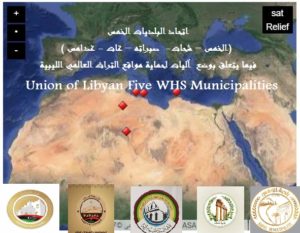
Therefore, specialists called to solve the problem, and workshops were held in various Libyan cities. The Department of Antiquities, headed by Dr. Fathallah Khalifa Al-Haddad, and the Libyan Society for Human Rights adopted Benghazi, and they communicated with the mayors of the five municipalities, and decided to hold a workshop in Shahat, bringing together the five mayors, despite the political division. They called out and met in Shahat in coordination with the Department of Antiquities. They established this union in order to hold a meeting every three months, in the presence of archaeological specialists. They later produced the idea of the strategic committee that they established and made part of the plan of the Government of National Accord. This resulted in the city of Ghadames being almost removed from the danger list.
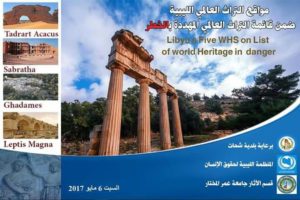
The reason for these cities entering the danger zone is because of the management style and its weakness, and all of this requires coordination, management, a body, and a real institution capable of managing human resources, and serious attempts to involve local authorities in heritage management.
Regarding the question: What are the roles of exhibitions and museums, their importance and evaluation, and their current status?
He answered: Museums in Libya are still closed, and unfortunately they need to be reconsidered. They are a traditional system, as if it were a photo gallery, and the role of the museum is important in education and spreading awareness and culture. Unfortunately, we do not have museums, but rather warehouses. We do not have real museums, which can be visited and known. What is in it is available on the Internet. Unfortunately, we have artifacts in the museum about which there is no information!
The administration should look at the museum and link it to education, as museums have an educational and cultural role.
He answered the question: The theft of antiquities and its problems. Is there an inventory of what is stolen? Do you know the parties that acquired these stolen items, especially since we recently heard news about the recovery of the head of the statue of Empress Faustina the Younger, which was stolen and smuggled to the state of Austria?
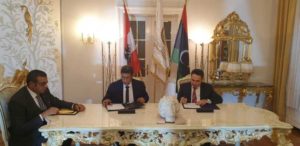
He said: The theft of antiquities in Libya has been present since the end of the 17th century AD. There is a major attack. Many antiquities are recorded and known to have been brought from Libya. For example, a group of English officers carried out excavations with the approval of the Ottoman authorities. They took 146 sculptures, which are now in the British Museum. It says it was brought from Shahat! The problem with retrieving it is due to the laws of those countries and the current situation in Libya.
The biggest problem in fact is those large statues that were transported through airports and with a large crane, with very great work, and facilities at the ports. New antiquities are discovered and go abroad without being known or seized or any information about them, and this indicates collective, organized, institutional work!
The artifacts stolen from the Benghazi treasure from the Bank of Libya in Benghazi have not been investigated since 2011. The treasure and the artifacts were stolen. The blame falls on the institution, whether the antiquities or the bank. After it was stolen, information was requested and brought from the Italian Foreign Ministry, because this treasure was returned by the Italian Foreign Ministry. To Libya in 1955. Libya put it in storage without studying it, evaluating it, describing it, or cataloging it. Punishment should be directed at the negligent institution and not the people. Unfortunately, all of this indicates that we are not a country!
We have a number of problems, including that we were unable to locate our archaeological sites. We have only discovered less than 20% of Libya. Today, if you wandered around my city of Shahat, you would find the excavations of thieves everywhere in the complete absence of the Libyan authorities and effective administration.
He answered the question: How long will we continue to search for a conscious legislator, and what can we do now to protect our antiquities until the legislator becomes aware?
He said: True protection lies in creating an aware society, in building a strategy for awareness and identifying the segments targeted by awareness, its relationship to the building, its investment, and its value.
When the citizen feels that these antiquities are mine, I will not contribute to their destruction, but rather I will contribute to protecting them. A friendly relationship must be built between the citizens and the heritage on their land.
Heritage and antiquities must remain sustainable and develop at a steady pace, and this requires truly effective management in Libya.
Regarding the question: The programs that are shown on the channels, are there government agencies that monitor the effects and are referred to so that the information is accurate, correct and responsible?
He answered by saying: I have no knowledge of that, but they are supposed to rely on the antiquities departments in the universities or the Department of Antiquities and research bodies, and most of the programs that I have seen are accurate because they usually go through consultants and experts. We do not lack experience, but we lack management and organization.
Dr. concluded. Ahmed Issa Faraj said: We need to unify the agencies that care for antiquities, and we need to reconsider the antiquities care law, especially the absolute authority of antiquities to give status to what is heritage and antiquities, and the security authorities should be subordinate to antiquities. We need a new management of heritage in Libya. It is centralized and has branches in the various municipalities associated with it.
To watch the full meeting here.


